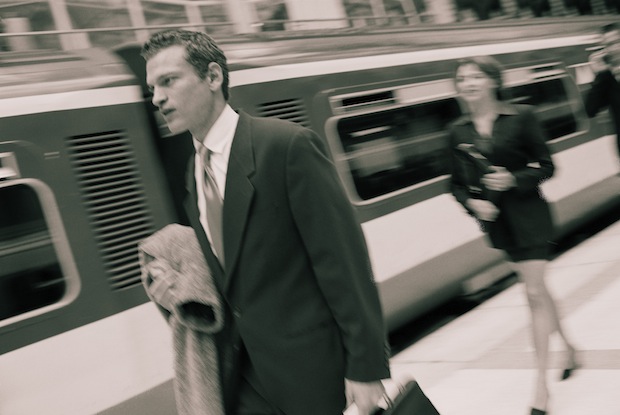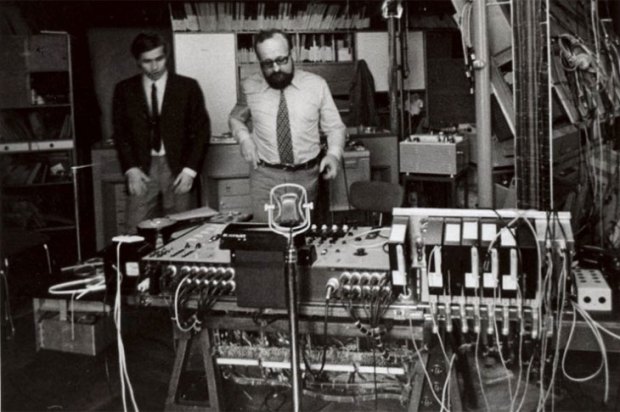It’s such a simple idea. Take a tape recorder. Hang around at the entrance to a railway station or in the departure lounge of an airport. Look for an intriguing face, an unusual couple, a dashing outfit. Rush up to them (having remembered to switch on the recorder) and ask, ‘Where are you going?’ As Catherine Carr said at the beginning of her programme for the Freedom 2014 series on the BBC World Service at the weekend, ‘Every interrupted journey is a portal into somebody’s life.’
Of course, in Where are you going? (produced by Jo Coombs) we only got to hear from the travellers who had something interesting to tell us, but even so this was an hour of pure radio, with so many vivid snapshots, such compelling stories. It was as if we were given insights into a whole life as Carr’s interviewees told us in just a few minutes before dashing off to catch a train or plane about the journeys they were about to take and why. In those moments of transition, perhaps, the real essence of a person comes into play.
Pity the poor philosophy professor who is caught by Carr as he is just about to get on a train on his way home to Manchester from Cambridge, where he had been giving a lecture. He made the mistake of telling Carr right away, without needing to be prompted, what his talk had been about. ‘The philosophy of language and the theory of truth.’ Go on, she asks him, in the two seconds before the train leaves, tell us what was ‘the thrust of your talk’.
He laughs nervously. ‘I’m trying to explain what it means to say that truth depends on reality.’ Not, he adds, ‘in a heavy-duty metaphysical relation. It’s a conceptual relation.’ Clear as mud to me, but how revealing to hear from a man who must spend his working (and waking) hours pondering such things.
As Carr says, ‘Sometimes we pack our bags not to change our own lives but to change the lives of others.’ At Peterborough she bumped into a very smartly dressed young woman who was trying to hail a cab having just got off a train. ‘You look really smart,’ said Carr. ‘Are you going anywhere exciting?’ Nowhere special, as it turned out, but then came a revelation that for a few seconds left Carr speechless.
The woman (anonymity was key to the exercise) was taking a course in beauty therapy, which, Carr said, explained her ‘very nice’ eyebrows and ‘great skin’. The woman went on, ‘I left the army as a medic… I wanted to do something I feel more comfortable with.’ From the forces to make-up advice? Carr began probing a little. ‘I wanted something that would be more flexible for me and my son and my family.’ I’m not sure that made any more sense. But then she added, quite matter-of-factly, ‘I got blown up in Afghanistan.’
‘But I can’t see a blemish on you,’ Carr exclaimed, incredulously.
It turned out that behind her handbag it was possible to see that the woman’s right thigh was a different shape from her left.
‘What does it feel like to be blown up?’ asked Carr.
‘I was helping someone,’ said the woman. ‘You don’t think it will be you next.’
There was no logic to Carr’s sequence of stories. One minute we were hanging round Heathrow, the next in the middle of Dakar. But this random quality meant we almost shared Carr’s experience of not knowing what she might hear next, that sense of anticipation and fascination. What will this person’s story really be?
At King’s Cross she asked a young woman where she was going. ‘I don’t know. It’s a surprise.’ It turned out her boyfriend had told her at the last minute that they were going away for the weekend and that she need only pack her usual clothes but she must take her passport.
Carr took the boyfriend aside. ‘Where are you going?’
Not as exciting as you might think. Bruges. But very romantic. ‘There’s a ring in my suitcase,’ he explained.
On Radio 4 on Saturday night, the queen of print interviewers, Lynn Barber, gave us a masterclass on how to do it. In Archive on 4: The Interviewer Stole the Show she told us how the magazine and newspaper interview had become a work of ‘literary ambition’ and not just ‘a record of a conversation’, with the writer, rather than the subject, taking centre-stage. Barber herself perfected the art, along the way giving her readers a quite new understanding of celebrities such as Jerry Hall, Alan Sugar, Ben Elton and Boy George. She watches, she says, for details that bring a person alive on the page, using real dialogue that takes place in real time, and is fearless in asking blunt questions that she knows her subject won’t want to answer. Intriguingly, for someone who is known as the Demon Barber, she thought Anthony Clare’s Radio 4 series In the Psychiatrist’s Chair was ‘too dangerous’, not liking the way he used his professional knowledge to prise open his subjects.
Got something to add? Join the discussion and comment below.
Get 10 issues for just $10
Subscribe to The Spectator Australia today for the next 10 magazine issues, plus full online access, for just $10.
You might disagree with half of it, but you’ll enjoy reading all of it. Try your first month for free, then just $2 a week for the remainder of your first year.














Comments
Don't miss out
Join the conversation with other Spectator Australia readers. Subscribe to leave a comment.
SUBSCRIBEAlready a subscriber? Log in